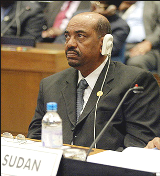African Union summit opens with alarm bells sounded over Sudan’s Darfur
 ADDIS ABABA, July 6 (AFP) — The crisis in Darfur and other conflicts took centre stage at the start of a major African Union (AU) summit, where UN chief Kofi Annan warned the catastrophe in western region of Sudan would worsen if no action was taken.
ADDIS ABABA, July 6 (AFP) — The crisis in Darfur and other conflicts took centre stage at the start of a major African Union (AU) summit, where UN chief Kofi Annan warned the catastrophe in western region of Sudan would worsen if no action was taken.
But countering this pessimism, the AU’s chief executive issued a rallying cry at the meeting in Addis Ababa: “Africa is back.”
“Africa is often presented as a risk for itself and the rest of the world,” AU Commission Chairman Alpha Oumar Konare told presidents from across the continent. “We reject this image.”
“For us, Africa is a great opportunity…. You will continue to make history, to accelerate history…. You will see clearly that Africa is back,” he said.
Konare has led efforts to revitalize the continent’s collective body, transforming the much-maligned and ineffectual Organisation of African Unity into the two-year-old AU, and injecting it with a fresh determination to replace poverty and conflict with prosperity through greater unity and security.
“This continent, this land so rich in natural resources, is a demographic force,” said Konare, noting that by 2025, there will be some 1.3 billion Africans, “almost as many as China, or India, more than the US and the European Union combined”.
But alongside this upbeat message came the UN secretary general’s warning, echoed by the AU’s own Peace and Security Council (PSC), that the crisis in Darfur would worsen if neglected.
“Without action, the brutalities already inflicted on the civilian population of Darfur could be a prelude to even greater humanitarian catastrophe, a catastrophe that could destabilize the region,” Annan told the summit’s opening session.
Top UN officials have already described the situation in Darfur, where a rebel uprising in February 2003 prompted a vicious response from government forces and their allied militias, as the world’s worst humanitarian crisis.
More than 10,000 people have been killed in Darfur and over a million displaced — many of them to neighbouring Chad — and aid agencies are warning of a potential major famine.
“I remind the government (of Sudan) of its sacred duty to protect its civilians and the rebel groups of their responsibility and duty to respect the ceasefire and work with the government to end the conflict peacefully,” said Annan, who visited Darfur last week.
The AU is planning to deploy an armed force of some 300 troops to Darfur to protect its own ceasefire monitors and returning refugees.
The heads of state themselves are likely to express their “grave concern” about Darfur, according to a draft proposal prepared by foreign ministers meeting ahead of the summit.
The text notes “regular reports of human rights abuses carried out by the Janjaweed militia,” but falls short of openly criticising the government in Khartoum that backs these forces.
A report by the Peace and Security Council to be presented to the African heads of state said events in Darfur had resulted in the most catastrophic humanitarian situation and gross human rights violations. It urged that the AU stay involved until a lasting solution is found.
In effect, the Darfur crisis has come to be considered as a test of the AU’s commitment to conflict resolution through concerted joint efforts.
Other trouble spots on summit agenda are Ivory Coast, Democratic Republic of Congo (DRC) and Burundi.
Efforts to normalize DRC after a devastating 1998-2003 war involving many neighbouring states including Rwanda came close to collapse in late May when former rebels now in the army mutinied in the east and took control of a major town for a week, prompting a slanging match between Kigali and Kinshasa.
Serious threats posed to the transitional process in DRC call for a dynamic action on the part of the African Union, the PSC said its report.
The report reiterated a recommendation that the UN beef up its peacekeeping force in DRC, which now comprises 10,800 men.
Also Tuesday, leaders of Ivory Coast — still troubled in the wake of a September 2002 rebellion — and some of its neighbours held a mini-summit on the sidelines of the main event in an effort to quell tensions in the west African region.
Further talks at reviving the Ivorian peace process will take place in the Ghanaian capital Accra on July 29, Annan said Tuesday after a high-level meeting on the sidelines in Addis Ababa.
Also during the summit’s first session, Nigerian President Olusegun Obasanjo was chosen to replace his Mozambican counterpart Joaquim Chissano as the AU’s revolving chairman.
